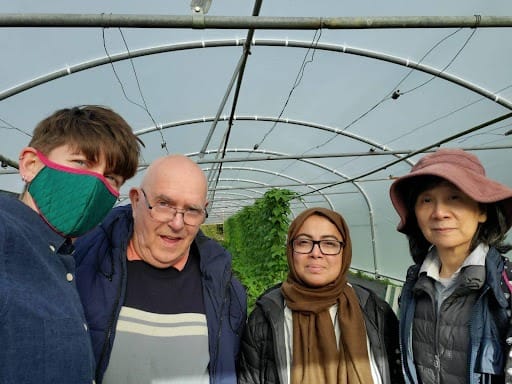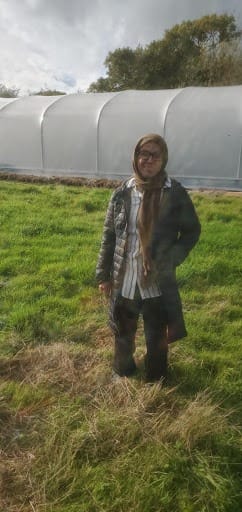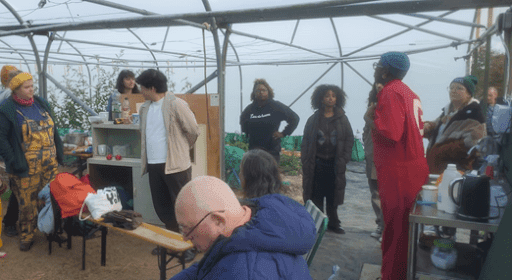Folx Farm in Hastings is jump-starting an experiment that could help shape the future of how diaspora communities access fruit and vegetables in the UK – starting with Tower Hamlets, a borough where residents are currently costed out of organic, nutritionally dense and culturally appropriate fruit and vegetables.
The farm is piloting an approach for growing and subsidising organic produce that is inspired by a model developed in the USA.
The Food Access Fund works by a grower’s salary being covered by donations from restaurants and food business partners. The grower maintains a dedicated growing space on the farm to grow fruit and vegetables that Tower Hamlets community partners sell at their weekly markets. The mustard, khodu, coriander and uri grown on the farm is as cheap as the produce shipped in from abroad but have far more nutrients and require many less air miles.
Local residents Bee (former nurse, volunteer and community researcher), Michael (volunteer at our Forgotten Neighbours and East End Homes food bank) and Nasrat (community worker and anti-poverty campaigner) headed to the farm as it drew to the close of its first growing season developing the FAF approach, and offered some reflections on the train ride home.



Bee: It’s great that they are growing food that’s in demand by the people in Tower Hamlets and making it accessible to the community through the food coop. The positive side is it’s a very big farm. Maybe the farm could be more productive with more workers. It could be a working farm but also a camp for adventuring, perhaps bringing different generations together. It’s early days, but I wonder if it could be an educational place. The pilot could be spread out to other boroughs.
Nasrat: Yes, I wonder if school kids could go and learn there. It could be a trip out from school. Some people don’t know where carrots come from. It was great that we all learned how to plant garlic. The community can also get something out of visiting there. They are very brave but I think they need help to survive.
Michael: I wonder if they could link up with food charities as well as the food coops…
Nasrat: In Bengali communities it’s possible to grow lots of food at home in our greenhouses. They are probably searching and asking people to know how to grow. Spitalfields City Farm are really good at growing Bengali vegetables. I wonder if they could help.
Bee: I would also like to see a plot closer to Tower Hamlets. Local people should have a place of their own in their local area too.
Nasrat: My friend wants an allotment and it’s impossible to find one in Tower Hamlets.
Nasrat: I think the farm should be scaled up to grow more. If they learn how to grow the Bengali foods at scale it would reduce so many air miles. We need to support farmers. If they give up they’ll be ok, they’ll do something else. But it’ll be our loss. We’ll lose the food. It seems like really hard work. If I didn’t go today, it wouldn’t have occurred to me how hard it is. We need to support them.
Bee: Alot of the land hasn’t been put into use yet. If it’s successful, if it’s going to be national, the government should be involved. For it to be able to be sustainable this might need to be a national government scheme.
Michael: It would be good to get the council involved to tell the government to support and give funds to farm like this.
Nasrat: You always see on the news that farmers are struggling. We would all support a right to grow in Tower Hamlets and a basic income for farmers. It’s a great way to cut greenhouse gases too.
You can support Folx Farm by:
If you’re a restaurant you can support Folx Farm’s Food Access Fund (FAF) project through donations. For example, one restaurant in Tower Hamlets has chosen to give all the profits from their mixed salad, which often appears on their lunch menus. Other options Folx Farm have explored involve adding a charitable donation to customers’ bills in aid of FAF, fundraising for them in some other creative way, or just donating a one-off sum.
As an individual, you could volunteer your time and expertise by applying to become a trustee. You can support Folx Farm to maintain the FAF growing space and learn new skills by volunteering to attend one of their open days.-
Find out more here: https://folxfarm.org/foodaccessfund

